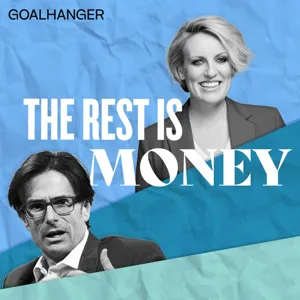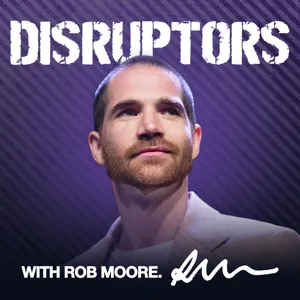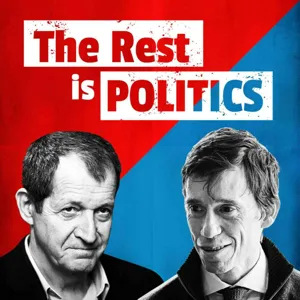55. Liz Truss: The Finale (Part 5)

Explore "political change" with insightful episodes like "55. Liz Truss: The Finale (Part 5)", "697. Andy & DJ CTI: U.S. And Ukraine Security Agreement, AstraZeneca Admits COVID Vaccine Side Effect & Biden Jokes About Trump", "A Communist Britain? Nigel Farage Slams the UK Government", "Live: 25 Years of Devolution (Part 1)" and "Blame Capitalism: The 99%" from podcasts like ""The Rest Is Money", "REAL AF with Andy Frisella", "Disruptors", "Holyrood Sources" and "Today, Explained"" and more!


In today's episode, Andy & DJ talk about the security agreement between the US and Ukraine, AstraZeneca admitting that it's COVID vaccine can cause rare side effects in its tense legal fight with the victims, and President Biden telling jokes on his campaign trail.

Rob is again joined by Brexit champion Nigel Farage as he shares his incredible journey from being debanked to thriving in the jungle on "I'm a Celebrity." Farage fearlessly tackles globalism, entrepreneurship, and the future of British politics. Discover the secrets behind his resilience, his friendship with Trump, and his potential return to the political arena in this must-listen interview.
Nigel Reveals
BEST MOMENTS
"The corporate world in Britain has been completely infested with uber liberal, left wing, diversity, inclusion, cobblers. Absolute cobblers. And they feel it's okay to discriminate against you on the basis of your views."
"The thought that somebody, just because they're related to me, has a business account closed, frankly, is monstrous."
"From 2030, under Jeremy Hunt's plans, there will be a central bank digital currency. If they can control your bank account, if they can control your freedom, you might as well be living under communism."
"Never believe the BBC because they will all tell you that cryptocurrencies are valueless and a flash in the pan. They're not."
"Look, you know, one thing Trump did in his first term, he got people in senior positions in government who'd never been in politics before. But had been massively successful businessmen and businesswomen who built corporations, who paid lots of tax."
"Unless you create wealth, you can't have hospitals. You can't have schools. You have to create wealth. And Trump understands that. I'm not, I'm not actually sure that the current Labour and Conservative parties get it."
"Living in a democratic nation state is a damn sight better than any other form of life that mankind, in its two million years of evolution, has yet come up with."
"There is no substitute in life for sheer, honest, hard work. And that may be a message that people don't want to hear. Because they want to think, no, there is a piece of magic I can grab."
VALUABLE RESOURCES
bit.ly/Robsupporter
rob.team
Episode Sponsor - AG1
Claim your exclusive offer of AG1 at the link below
ABOUT THE HOST
Rob Moore is an author of 9 business books, 5 UK bestsellers, holds 3 world records for public speaking, entrepreneur, property investor, and property educator. Author of the global bestseller “Life Leverage” Host of UK’s No.1 business podcast “The Disruptive Entrepreneur”
“If you don't risk anything, you risk everything”
CONTACT METHOD
Rob’s official website: https://robmoore.com/
Facebook: https://www.facebook.com/robmooreprogressive/?ref=br_rs
LinkedIn: https://uk.linkedin.com/in/robmoore1979
See omnystudio.com/listener for privacy information.

Join Calum Macdonald, Geoff Aberdein and Andy Maciver for a Holyrood Sources podcast special. We’re bringing together guests who have been at the heart of the story of devolution over the last 25 years to reflect on how devolution happened, what’s happened since and what should happen next. As part of the night, we’ll reveal the results of exclusive polling assessing how people across Scotland view devolution, 25 years since the establishment of The Scottish Parliament.
In part one:
Fergus Ewing,
Wendy Alexander,
Henry McLeish,
Jim Wallace,
Lorraine Davidson
Jack McConnell,
Mark Diffley,
Nicola McEwen
Become a member at https://plus.acast.com/s/holyroodsources.
Hosted on Acast. See acast.com/privacy for more information.




Kentucky has passed some of the strictest anti-trans and anti-abortion bills in the country, but is that really what Kentuckians want? Desi Lydic returns to her home state to ask locals how they feel about their lawmakers and finds out how people are trying to make the state better. And in Long Story Short, Desi warns about the dangerous trappings of the "wellness" industry, from expensive snake oil products to dangerous medical alternative trends.
See omnystudio.com/listener for privacy information.




Across the world, developed nations have locked themselves into unsustainable, energy-intensive lifestyles. As environmental collapse threatens, the journalist Noah Gallagher Shannon explores the lessons in sustainability that can be learned from looking “at smaller, perhaps even less prosperous nations” such as Uruguay.
“The task of shrinking our societal footprint is the most urgent problem of our era — and perhaps the most intractable,” writes Shannon, who explains that the problem of reducing our footprints further “isn’t that we don’t have models of sustainable living; it’s that few exist without poverty.”
Tracing Uruguay’s sustainability, Shannon shows how a relatively small population size and concentration (about half of the country’s 3.5 million people live in Montevideo, the capital) had long provided the country with a collective sense of purpose. He also shows how in such a tight-knit country, the inequalities reach a rapid boil, quoting a slogan of a Marxist-Leninist group called the Tupamaros: “Everybody dances or nobody dances.”
Looking for answers to both a structural and existential problem, Shannon questions what it would take to achieve energy independence.
This story was written by Noah Gallagher Shannon and recorded by Audm. To hear more audio stories from publications like The New York Times, download Audm for iPhone or Android.

✨ DEBRIEF | Unpacking the Episode:
https://shows.banklesshq.com/p/debrief-ben-hunt
Joining us today for his second appearance on Bankless, the macro narrative gigabrain, Ben Hunt. Ben is an investor and creator of Epsilon Theory, a website, and community that examines markets through the lenses of game theory and history.
On today’s episode, Ben shares his rich insights on the U.S.’s current macro landscape by taking us through a brief history of the past, why our political coordination game is broken, and of course–who’s stealing the wealth.
------
📣 Push | Try the Communication Protocol of Web3
https://bankless.cc/Push
------
🚀 SUBSCRIBE TO NEWSLETTER: https://newsletter.banklesshq.com/
🎙️ SUBSCRIBE TO PODCAST: http://podcast.banklesshq.com/
------
BANKLESS SPONSOR TOOLS:
⚖️ ARBITRUM | SCALING ETHEREUM
https://bankless.cc/Arbitrum
👯 DESO | DECENTRALIZED SOCIAL BLOCKCHAIN
https://bankless.cc/Deso
🦁 BRAVE | THE BROWSER NATIVE WALLET
https://bankless.cc/Brave
📡 TRUEFI | CRYPTO FINANCIAL HUB
https://bankless.cc/TrueFi
👾 SEQUENCE | ALL-IN-ONE PLATFORM
https://bankless.cc/Sequence
⚡️FUEL | THE MODULAR EXECUTION LAYER
https://bankless.cc/fuel
------
Timestamps:
0:00 Intro
7:43 Unique Time in History?
11:56 Repricing Money
18:48 What’s Different?
22:24 US Wealth Growth vs. US GDP Growth
30:55 Hollowness
42:06 Stealing the Future
50:09 Kicking the Can Down the Road
55:23 The Widening Gyre
1:00:48 Political Coordination Game
1:06:26 Constitutional Apportionment Amendment
1:12:27 Common Denominators
1:15:14 Bitcoin
1:25:12 Tornado Cash & Freedom Narrative
1:32:53 Do We Have Hope?
1:34:28 Closing & Disclaimers
------
Resources:
Ben Hunt
https://twitter.com/EpsilonTheory
Epsilon Theory
https://www.epsilontheory.com/
Ben’s 1st Bankless Appearance
https://youtu.be/JlMooJyaFBc
Hollowed Out (“Hollow Men, Hollow Markets, Hollow World”)
https://www.epsilontheory.com/hollow-men-hollow-markets-hollow-world-2/
The Widening Gyre
https://www.epsilontheory.com/the-widening-gyre/
In Praise of Bitcoin
https://www.epsilontheory.com/in-praise-of-bitcoin/
-----
Not financial or tax advice. This channel is strictly educational and is not investment advice or a solicitation to buy or sell any assets or to make any financial decisions. This video is not tax advice. Talk to your accountant. Do your own research.
Disclosure. From time-to-time I may add links in this newsletter to products I use. I may receive commission if you make a purchase through one of these links. Additionally, the Bankless writers hold crypto assets. See our investment disclosures here:
https://www.bankless.com/disclosures

Bret Speaks with Michael Shellenberger regarding his recent gubernatorial campaign in California. They discuss the difficulty inherent in running for political office outside of the two major parties. In addition, they touch on topics ranging from nuclear power to Covid, and how we might go about escaping the modern predicament we have landed in.
Find Michael at his website: https://shellenberger.org/
Buy Michael’s latest book on Amazon: https://www.amazon.com/San-Fransicko-Progressives-Ruin-Cities/dp/0063093626/ref=tmm_hrd_swatch_0?_encoding=UTF8&qid=1652994380&sr=8-1
*****
View on Spotify Video: https://open.spotify.com/episode/1QfwliVVnToxKoYlzYHUMZ
*****
Find Bret Weinstein on Twitter:
@BretWeinstein (https://twitter.com/BretWeinstein?s=20&t=Z8UMHvIbcf3PMJHRm-MnuA),
and on Patreon (https://www.patreon.com/bretweinstein).
Please subscribe to this channel for more long form content like this, and subscribe to the clips channel @DarkHorse Podcast Clips for short clips of all our podcasts.
Check out the DHP store! Epic tabby, digital book burning, saddle up the dire wolves, and more: https://www.darkhorsestore.org
Theme Music: Thank you to Martin Molin of Wintergatan for providing us the rights to use their excellent music.
*****
Timestamps:
(00:00) Introduction
(01:40) Bret misjudged Michael
(04:20) Sponsors
(05:45) Disappointment from election
(07:40) Yang, Amash, Gabbard
(10:20) IDW for political change and previous elections
(14:32) Andrew Yang and lone wolf disease
(20:55) Third party and hidden tribes report
(31:45) Party identity
(34:40) Lack of endorsements
(41:12) Homelessness coverage is now more balanced
(43:52) Michael Shellenberger on COVID
(45:35) Bret's COVID position
(01:04:20) Critics of Bret's ivm position
(01:13:52) COVID dissidents
(01:18:30) Nuclear weapons
(01:28:10) Nuclear energy
(01:33:52) Energy transitions and fusion
(01:41:30) Spent fuel rods and fuel pools
(01:48:40) Fukushima and Chernobyl
(02:00:32) Deaths from Nuclear, fentanyl, COVID
(02:04:22) Water cooled nuclear plants and coolants
(02:08:25) Human factors and Three Mile Island
(02:11:20) Dealing with spent fuel fires
(02:20:40) Dry cast storage
(02:25:20) Power grid down
(02:37:40) WIPP project
(02:45:50) What would Bret do with energy
(02:50:00) Nuclear war inevitable
(02:59:30) Bret's skepticism
(03:03:00) Wrap up
Support the show
The Russian political scientist Ilya Matveev recently described the impact of the West’s sanctions on his country as “30 years of economic development thrown into the bin.” He’s not exaggerating. Economists expect the Russian economy to contract by at least 15 percent of G.D.P. this year. Inflation is spiking. An exodus of Russian professionals is underway. Stories of shortages and long lines for basic consumer goods abound.
The U.S. and its allies have turned to sanctions as a way of taking action against Russia’s atrocities without direct military intervention. But to describe these sanctions as anything short of all-out economic warfare is euphemistic. Measures like these might be cloaked in the technocratic language of finance and economics, but the immiseration they cause is anything but abstract.
Nicholas Mulder is a historian at Cornell University and the author of the terrifyingly relevant new book “The Economic Weapon: The Rise of Sanctions as a Tool of Modern War.” In it, Mulder focuses on the last time economic warfare was waged at the scale we’re witnessing today, the period between World War I and World War II. And the book’s central lesson is this: We ultimately don’t know what’s going to happen when sanctions of this magnitude collide with the ideologies, myths and political dynamics of a given country. They could persuade the targeted country to back down. But they could also make it so desperate that it becomes more aggressive or lashes out — as Germany and Japan did on the eve of World War II.
So this is a discussion about what kind of weapon sanctions are, whether they actually achieve their goals and how they might shape the future of the Russia-Ukraine conflict — and the world. We also explore how sanctions “weaponize inflation,” whether they could lead to Vladimir Putin’s downfall in Russia, the toll they have taken on the Russian economy, how the West can leverage its sanctions to help bring about an end to the war in Ukraine, whether a European energy embargo could backfire, how this economic war is destabilizing countries around the world, the humanitarian crisis U.S. sanctions are helping create in Afghanistan, and what a foreign policy that didn’t rely so heavily on sanctions could look like.
This episode is guest hosted by Rogé Karma, the staff editor for “The Ezra Klein Show.” Rogé has been with the show since July 2019, when it was based at Vox. He works closely with Ezra on everything related to the show, from editing to interview prep to guest selection. At Vox, he also wrote articles and conducted interviews on topics ranging from policing and racial justice to democracy reform and the coronavirus.
Mentioned:
“The Inflation Weapon: How American Sanctions Harm Iranian Households” by Esfandyar Batmanghelidj
“Iran, Sanctions and Inflation as a Weapon of Mass Destruction” by Spencer Ackerman
Oligarchy by Jeffrey A. Winters
“If Joe Biden Doesn’t Change Course, This Will Be His Worst Failure” by Ezra Klein
Book recommendations:
Collapse by Vladislav M. Zubok
The Perfect Fascist by Victoria de Grazia
My Century by Aleksander Wat
Thoughts? Guest suggestions? Email us at ezrakleinshow@nytimes.com.
You can find transcripts (posted midday) and more episodes of “The Ezra Klein Show” at nytimes.com/ezra-klein-podcast, and you can find Ezra on Twitter @ezraklein. Book recommendations from all our guests are listed at https://www.nytimes.com/article/ezra-klein-show-book-recs.
“The Ezra Klein Show” is produced by Annie Galvin, Jeff Geld and Rogé Karma; fact-checking by Michelle Harris, Kate Sinclair and Mary Marge Locker; original music by Isaac Jones; mixing by Jeff Geld; audience strategy by Shannon Busta. Our executive producer is Irene Noguchi. Special thanks to Kristin Lin and Kristina Samulewski.

This episode contains strong language.
The sound of victory was loud. It was banging pots, honking horns and popping corks as supporters of President-elect Joe Biden celebrated his win.
But loss, too, has a sound. In the days after the U.S. election result was announced, some of the 71 million-plus Americans who backed President Trump are grieving.
Can the country overcome its differences? In discussions with voters in areas both red and blue, we traced the fault lines of the country’s deep rifts.
Guest: Astead W. Herndon, a Times national political reporter, spoke with voters in Mason County, Texas. Robert Jimison, Jessica Cheung and Andy Mills, producers of “The Daily,” and Alix Spiegel, an editor, also reported from across the country.
For more information on today’s episode, visit nytimes.com/thedaily
Background reading:

Today on the podcast I welcome along George Monbiot - who is is an author, Guardian columnist and environmental campaigner.
George cowrote the concept album Breaking the Spell of Loneliness with musician Ewan McLennan; and has made a number of viral videos. One of them, adapted from his 2013 TED talk, How Wolves Change Rivers, has been viewed on YouTube over 40m times. Another, on Natural Climate Solutions, that he co-presented with Greta Thunberg, has been watched over 50m times.
As we witness an improvement in the crisis and anticipate the relaxation of social distancing, I wanted to talk about the opportunities to learn and reform our political systems that globally have been woefully unprepared and slow to respond.
As we try to recuperate the losses both emotionally, physically and financially I’m trying to cultivate the opinions of thinkers from around the world who have long documented the unfolding crises in society that have now spectacularly revealed themselves to us.
In this episode, we talk about:
And don't forget to subscribe to The Doctor's Kitchen newsletter where we will be continuing to share weekly science based recipes and tips to help you live the healthiest and happiest lifestyle possible.
Guest Social Media Links
Hosted on Acast. See acast.com/privacy for more information.


After years of false starts, the United States has signed a landmark deal with the Taliban to end the war in Afghanistan. We traveled to the front lines of the war — and to the signing ceremony in Doha, Qatar — to investigate whether peace is actually possible.
Guest: Mujib Mashal, senior correspondent for The New York Times in Afghanistan.
For more information on today’s episode, visit nytimes.com/thedaily.
Background reading:

Stay up to date
For any inquiries, please email us at hello@podcastworld.io